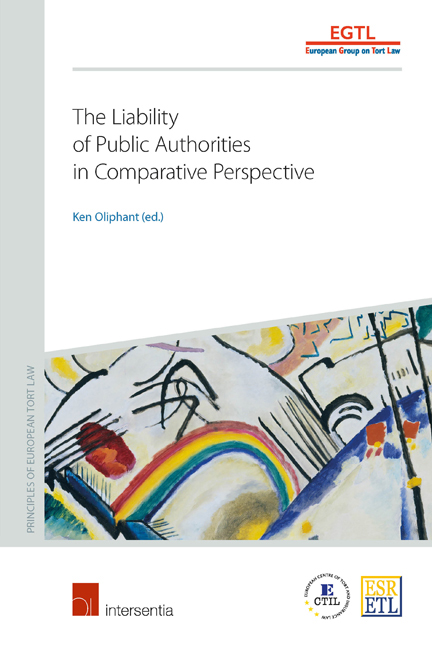Book contents
- Frontmatter
- Preface
- Contents
- List of Authors
- Introduction
- Questionnaire
- PART I PUBLIC AUTHORITY LIABILITY OUTLINED
- Austria
- Belgium
- Czech Republic
- Denmark
- England and Wales
- France
- Germany
- Greece
- Israel
- Italy
- The Netherlands
- Norway
- Poland
- Portugal
- South Africa
- Spain
- Switzerland
- The United States
- European Union
- The Liability of Public Authorities: an Economic Analysis
- PART II CASE STUDIES
- PART III CONCLUSIONS
France
from PART I - PUBLIC AUTHORITY LIABILITY OUTLINED
Published online by Cambridge University Press: 27 November 2017
- Frontmatter
- Preface
- Contents
- List of Authors
- Introduction
- Questionnaire
- PART I PUBLIC AUTHORITY LIABILITY OUTLINED
- Austria
- Belgium
- Czech Republic
- Denmark
- England and Wales
- France
- Germany
- Greece
- Israel
- Italy
- The Netherlands
- Norway
- Poland
- Portugal
- South Africa
- Spain
- Switzerland
- The United States
- European Union
- The Liability of Public Authorities: an Economic Analysis
- PART II CASE STUDIES
- PART III CONCLUSIONS
Summary
INTRODUCTION
OVERVIEW
The French law of administrative liability is based upon the general principle that a claimant may gain damages for the fault of a public body which has caused loss. This is supplemented by a well-developed doctrine of no-fault liability. In terms of fault liability, the notion of a faute de service is a crucial concept. It both demarcates the circumstances in which the state, or another public authority, may be liable for the actions of its servants1 and provides the contours of wrongful behaviour.
The fundamentals of French responsabilité administrative are to be found in the rich case law of the administrative courts. Although it might seem surprising to refer to case law within a legal system which is premised upon the predominance of droit écrit, French droit administratif is of course a jurisprudential system par excellence.
Public authority liability claims fall within the purview of the administrative courts with some limited exceptions – see below.
HISTORICAL EVOLUTION
In French law, as in other legal systems, there has been a gradual evolution of public authority liability (responsabilité administrative) over time to the broader position in the present day. The initial historical approach was enshrined in the maxim the ‘le Roi ne peut mal faire’ whereby the monarch benefited from a quasi-immunity (irresponsabilité) throughout the pre-revolutionary ancien régime. Partial erosions of that immunity occurred immediately after the 18th century Revolution but during the 19th century the quasi immunity of civil servants was enshrined in the Constitutions since any legal action against a civil servant required the prior authorisation of the Conseil d'Etat which occurred only once. As far as the liability of public authorities themselves was concerned, it developed in a piecemeal way where contractual liability was at stake or if specific statutes provided for it (such as public works liability, Loi du 28 pluviose an VIII).
- Type
- Chapter
- Information
- The Liability of Public Authorities in Comparative Perspective , pp. 155 - 176Publisher: IntersentiaPrint publication year: 2016

